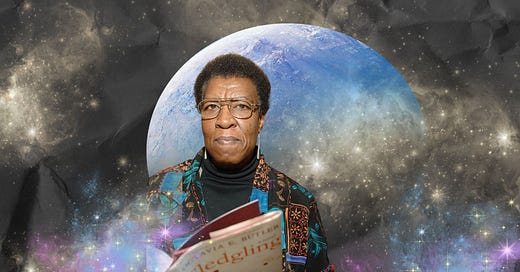A Black woman’s war prep plan to spread radical hope at the edge of ruin
Octavia Butler poses an essential question to all of us during trying times.
Hiya family! Welcome back to Black Joy Behind the Scenes 📽️, where I help y’all settle into the softness of your Sunday by giving y’all a glimpse beyond the journalism veil of my nationwide media brand Black Joy. My mission is to report on the different ways we as Black people continue the practice of cultivating liberatory joy in our lives. And my gosh, do we need some of that today.
When I first started the brand eight years ago, I was afraid I would come off as naive by talking about joy during times like these. The current presidential administration bombed three of Iran’s nuclear sites, inserting the United States in a war between Israel and Iran, adding to the instability of the region, and making U.S. troops in the area vulnerable to retaliation. Military families must have nerves of steel because I wouldn’t be able to handle this much drama. My heart is with y’all…and the rest of us. All of us. Not just Americans.
When this turmoil first boiled up last week, we did what Black folks typically do. We baked breaking news into our jokes and turned chaos into a comedy show. Black queer therapist Shahem Mclaurin made one of my favorite responses on the situation.
Here’s a transcript for those who are hearing impaired (Or if technology is technologing for you and deciding not to work today 🙄). Mclaurin posted an Instagram reel with the caption, “You say ‘we’ a lot. Oh, you speak French now?’:
Bi**h, let me be clear, if you say that America is going to war with Iran, don't say “we.” Don't say we, because it's not a ‘we’ included in this. Don't say us. I'm not doing none of that. I don't support or endorse any of it.
I love Mclaurin’s viewpoint on the situation. Beneath the veneer of humor, there’s a glaring truth to be addressed. When war is declared, the most vulnerable populations, who are often people of color with little say in the matter, are harmed the most. I dreamed about the consequences of war last night, how it orphans children and makes the unhoused hungry. Of course, this isn’t the first whammy of a decision made by this administration. Thus, it’s easy to be overwhelmed by the weight of it all and accept apathy instead.
When I woke up from this dream, mini think pieces about the bombing trickled into my social media feeds. One post was about preparation plans for Americans during wartime, and my mind immediately thought about sci-fi legendary world wielder Octavia Butler. In January, there were a lot of discussions about her book “Parable of the Sower” and her prediction of the historic California wildfires which devoured the historically Black neighborhood of Altadena. After learning more about Butler’s work, I became concerned about people’s overemphasis on the tragedies she foresaw rather than the blueprint of radical hope she laid out in the book.
In the novel, Lauren Olamina, the story’s Black protagonist and teenage daughter of a Baptist preacher is also surrounded by climate change disasters, political upheaval and economic inequality. Instead of succumbing to the gravity of calamity, she created a new faith system called Earthseed that’s slightly different from the religion in which she was raised. Here’s a journal entry where Olamina warns about the consequence of apathy:
“God is Change, and in the end, God prevails. But God exists to be shaped. It isn’t enough for us to just survive, limping along, playing business as usual while things get worse and worse. If that’s the shape we give to God, then someday we must become too weak – too poor, too hungry, too sick – to defend ourselves. Then we’ll be wiped out.”
This is why the only war preparedness plan I am paying attention to is Octavia Butler’s. Through her storytelling, Butler reminds people of the power of personal agency, the importance of envisioning a better future for our descendants and how Black collective care makes that destiny possible. Her plot isn’t propelled by toxic positivity. Olamina and her community still practiced a disaster plan and self-defense. Butler uses her story to ask the reader a question: “What does radical hope look like for you, and what actions can you do to create a better tomorrow for your community?”
Butler repeats this lesson in an essay she wrote for Essence Magazine in 2000. She recalls an exchange between herself and a student reporter who asked if we are doomed to the misfortunes written in her books. Her response:
“I mean there’s no single answer that will solve all of our future problems. There’s no magic bullet. Instead there are thousands of answers–at least. You can be one of them if you choose to be.”
I hope you always choose to be the answer because Black joy doesn’t ignore oppression. It helps us thrive despite the misfortune placed upon us. I’ve always imagined Black joy as a life source of light gifted to us by our ancestors. It is then up to us to add to that well of vitality through our own actions of liberative joy for the sake of the next generations. This is the generational wealth that exists within our bloodline from birth.
To close all this out, I’m sharing this poem by
, a substack authored by my friend Devin Franklin. May their words embolden you to reach for radical hope today:explosions as often as blinks.
i wince,
clench,
grimace.
i don’t want this to feel normal. to be normal.
Toni said “I insist on being shocked.”
there is a failure of humanity when we harden to the decimation of a peoples, but a soft heart is a malleable one.
so i cry.
i weep.
i heave and i wail.
rather than sketch a cartoon, Compassion kneads me into something more three-dimensional. more...
human.
so that i keep looking my neighbor in the eye. give that $20. sit in at that city council meeting. smile at a child who has no clue the extent to which we cannibalize our own.
numbness isn't death, but a non-life.
so live. i beg of you.
softly,
dev <3








Thank you for including my poem on this necessary piece, friend.